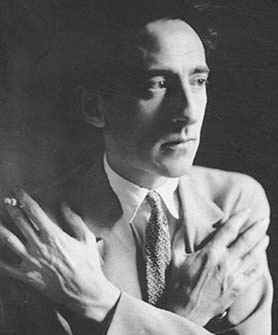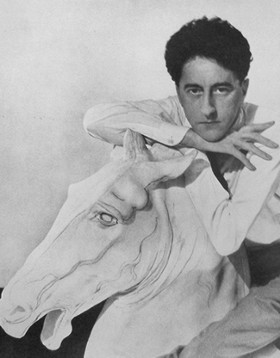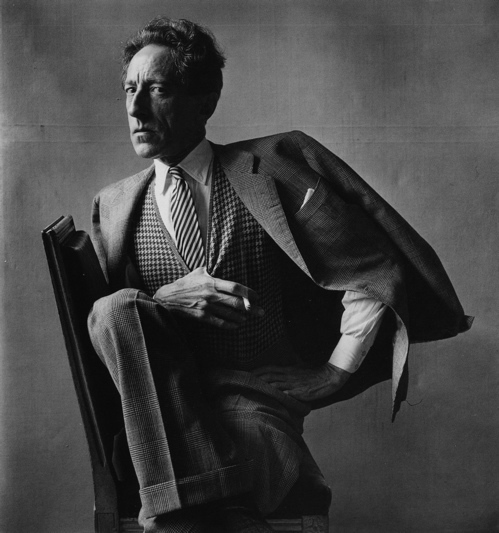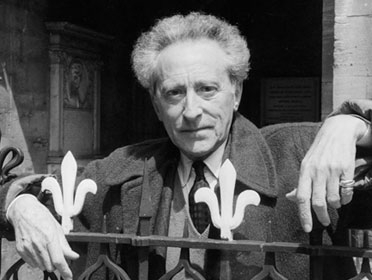<Back to Index>
- Meteorologist and 2nd Governor of New Zealand Robert FitzRoy, 1805
- Author Jean Maurice Eugène Clément Cocteau, 1889
- Admiral of the United States Navy David Glasgow Farragut, 1801
PAGE SPONSOR


Jean Maurice Eugène Clément Cocteau (5 July 1889 – 11 October 1963) was a French poet, novelist, dramatist, designer, boxing manager, playwright, artist and filmmaker. Along with other avant-garde artists of his generation (Jean Anouilh and René Char for example) Cocteau grappled with the "algebra" of verbal codes old and new, mise en scène language and technologies of modernism to create a paradox: a classical avant-garde. His circle of associates, friends and lovers included Pablo Picasso, Jean Hugo, Jean Marais, Henri Bernstein, Marlene Dietrich, Coco Chanel, María Félix, Édith Piaf (whom he cast in one of his one-act plays entitled Le Bel Indifferent in 1940), and Raymond Radiguet.
His
work was played out in the theatrical world of the Grands Theatres, the
Boulevards and beyond during the Parisian epoque he both lived through
and helped define and create. His versatile, unconventional approach
and enormous output brought him international acclaim. Cocteau was born in Maisons-Laffitte, Yvelines, once a small village near Paris, to
Georges Cocteau and his wife Eugénie Lecomte, a prominent
Parisian family. His father was a lawyer and amateur painter, who
committed suicide when Cocteau was nine. He left home at age fifteen.
Despite his achievements in virtually all literary and artistic fields,
Cocteau insisted that he was primarily a poet and that all his work was
poetry. He published his first volume of poems, Aladdin's Lamp, at nineteen. Soon Cocteau became known in the Bohemian artistic circles as 'The Frivolous Prince' — the title of a volume he published at twenty-two. Edith Wharton described him as a man "to whom every great line of poetry was a sunrise, every sunset the foundation of the Heavenly City..." In his early twenties, Cocteau became associated with the writers Marcel Proust, André Gide, and Maurice Barrès. During the Great War Cocteau served in the Red Cross as an ambulance driver. This was the period in which he met the poet Guillaume Apollinaire, Pablo Picasso, artist Amedeo Modigliani and numerous other writers and artists with whom he later collaborated. The Russian ballet master Sergei Diaghilev challenged Cocteau to write a scenario for the ballet - "Astonish me," he urged. This resulted in Parade which was produced by Diaghilev, designed by Pablo Picasso, and composed by Erik Satie in 1917. An important exponent of Surrealism, he had great influence on the work of others, including the group of composer friends in Montparnasse known as Les Six. The word Surrealism was coined, in fact, by Guillaume Apollinaire in the prologue to Les Mamelles de Tirésias, a work begun in 1903 and completed in 1917 less than a year before he died. "If
it had not been for Apollinaire in uniform," wrote Cocteau, "with his
skull shaved, the scar on his temple and the bandage around his head,
women would have gouged our eyes out with hairpins." Cocteau denied
being a Surrealist or being in any way attached to the movement. In 1918 he met the French poet Raymond Radiguet.
They collaborated extensively, socialized, and undertook many journeys
and vacations together. Cocteau also got Radiguet exempted from
military service. In admiration of Radiguet's great literary talent,
Cocteau promoted his friend's works in his artistic circle and also
arranged for the publication by Grasset of Le Diable au corps (a
largely autobiographical story of an adulterous relationship between a
married woman and a younger man), exerting his influence to garner the
"Nouveau Monde" literary prize for the novel. Some contemporaries and
later commentators thought there might have been a romantic component
to their friendship. Cocteau
himself was aware of this perception, and worked earnestly to dispel
the notion that their relationship was sexual in nature. There
is disagreement over Cocteau's reaction to Radiguet's sudden death in
1923, with some claiming that it left him stunned, despondent and prey
to opium addiction.
Opponents of that interpretation point out that he did not attend the
funeral (he generally did not attend funerals) and immediately left
Paris with Diaghilev for a performance of Les Noces (The Wedding) by the Ballets Russes at Monte Carlo. Cocteau himself much later characterised his reaction as one of "stupor and disgust." His opium addiction at the time, Cocteau said, was only coincidental, due to a chance meeting with Louis Laloy, the administrator of the Monte Carlo Opera. Cocteau's opium use and his efforts to stop profoundly changed his literary style. His most notable book, Les Enfants terribles, was written in a week during a strenuous opium weaning. In Opium, Diary of an Addict,
he recounts the experience of his recovery from opium addiction in
1929. His account, which includes vivid pen-and-ink illustrations,
alternates between his moment to moment experiences of drug withdrawal
and his current thoughts about people and events in his world. Cocteau's experiments with the human voice peaked with his play La Voix humaine.
The story involves one woman on stage speaking on the telephone with
her (invisible and inaudible) departing lover, who is leaving her to
marry another woman. The telephone proved to be the perfect prop for
Cocteau to explore his ideas, feelings, and "algebra" concerning human
needs and realities in communication. Cocteau
acknowledged in the introduction to the script that the play was
motivated, in part, by complaints from his actresses that his works
were too writer/director dominated and gave the players little
opportunity to show off their full range of talents. La Voix humaine was written, in effect, as an extravagant aria for Madame Berthe Bovy. Before came Orphée, later turned into one of his more successful films; after came La Machine infernale, arguably his most fully realized work of art. La Voix humaine is
deceptively simple — a woman alone on stage for almost one hour of
non-stop theatre speaking on the telephone with her departing lover. It
is, in fact, full of theatrical codes harking back to the Dadaists' Vox
Humana experiments after World War One, Alphonse de Lamartine's "La Voix humaine", part of his larger work Harmonies poétiques et religieuses and the effect of the creation of the Vox Humana ("voix humaine"), an organ stop of
the Regal Class by Church organ masters (late 16th century) that
attempted to imitate the human voice but never succeeded in doing
better than the sound of a male chorus at a distance. Reviews
varied at the time and since but whatever the critique, the play, in a
nutshell, represents Cocteau's state of mind and feelings towards his
actors at the time: on the one hand, he desired to spoil and please
them; on the other, he was fed up by their diva antics and was ready
for revenge. It is also true that none of Cocteau's works has inspired
as much imitation: Francis Poulenc's opera La Voix humaine, Gian Carlo Menotti's "opera bouffa" The Telephone and Roberto Rosselini's film version in Italian with Anna Magnani L'Amore (1948). There has also been a long line of interpreters including Simone Signoret, Ingrid Bergman and Liv Ullmann (in the play) and Julia Migenes (in the opera). According to one theory about how Cocteau was inspired to write La Voix humaine, he was experimenting with an idea by fellow French playwright Henri Bernstein. "When, in 1930, the Comedie Française produced his La Voix humaine... Cocteau
disavowed both literary right and literary left, as if to say, "I'm
standing as far right as Bernstein, in his very place, but it is an
optical illusion: the avant garde is spheroid and I've gone farther
left than anyone else." In the 1930s, Cocteau had an affair with Princess Natalie Paley, the beautiful daughter of a Romanov grand duke and herself a sometimes actress, model, and former wife of couturier Lucien Lelong. She became pregnant. To Cocteau's distress and Paley's life long regret, the fetus was aborted. Cocteau's longest lasting relationships were with the French actors Jean Marais and Edouard Dermithe, whom Cocteau formally adopted. Cocteau cast Marais in The Eternal Return (1943), Beauty and the Beast (1946), Ruy Blas (1947), and Orpheus (1949). In 1940, Le Bel Indifférent, Cocteau's play written for and starring Édith Piaf,
was enormously successful. He also worked with Pablo Picasso on several
projects and was friends with most of the European art community. Some
have believed that Cocteau was homosexual, however, as with his
friendship with Radiguet mentioned above, Cocteau himself specifically
denied any such element in their relationship. Nevertheless, it is
known that his collaborator Jean Marais was also his lover. Cocteau's films, most of which he both wrote and directed, were particularly important in introducing Surrealism into French cinema and influenced to a certain degree the upcoming French New Wave genre. Cocteau is best known for his novel Les Enfants terribles (1929), and the films Les Parents terribles (1948), Beauty and the Beast (1946), and Orpheus (1949). Cocteau died of a heart attack at his chateau in Milly-la-Forêt, Essonne, France, on 11 October 1963 at the age of 74. It is said that upon hearing of the death of his friend, the French singer Édith Piaf the
previous day, he choked so badly that his heart failed. He is buried
beneath the floor of the Chapelle Saint Blaise Des Simples in
Milly-la-Forêt. The epitaph on his gravestone set in the floor of
the chapel reads: "I stay with you" ("Je reste avec vous"). In 1955 Cocteau was made a member of the Académie française and The Royal Academy of Belgium. During his life Cocteau was commander of the Legion of Honor, Member of the Mallarmé Academy, German Academy (Berlin), American Academy, Mark Twain (U.S.A) Academy, Honorary President of the Cannes film festival, Honorary President of the France-Hungary Association and President of the jazz Academy and of the Academy of the Disc.

